Affiliate marketing is a great way to make money online, and it’s trendy in Canada. In fact, the Canadian affiliate marketing market is expected to reach $1.7 billion by 2026.
If you’re interested in how to start affiliate marketing in Canada, this complete guide is definitely for you.
To help you get started, we’ve outlined six steps to kickstart your affiliate marketing venture in the Great White North.
Now let’s begin!
115,000+ users worldwide have used UpPromote to start affiliate marketing. Now is your turn.
How to Start Affiliate Marketing in Canada: 6 Fundamental Steps
Do you want to make money online as an affiliate marketer? It’s not as simple as adding affiliate links to your website and waiting for the passive income to start rolling in.
Successful affiliate marketing requires identifying and presenting a target audience with relevant affiliate products. Other steps are also involved, such as keyword research and creating engaging content.
Here are the six key steps on how to start affiliate marketing in Canada:
Step 1. Select a suitable niche
Choosing a profitable affiliate niche is essential for success as an affiliate marketer.
If there is no demand for the products or services you promote, you will not make any sales.
So how to find a lucrative affiliate marketing niche?
The best niche for affiliate marketing in Canada depends on your interests, expertise, and the amount of competition in the niche. However, some of the most popular and profitable niches include:
- Beauty and Skincare: beauty products, skincare routines, and cosmetics.
- Travel and Tourism: travel-related services, hotels, flights, and travel accessories
- Home Improvement: Canadians invest in home renovations, making this niche ideal for promoting tools, appliances, and DIY products.
- Health and Wellness: Offers affiliate products related to fitness equipment, supplements, and holistic health for a health-conscious audience.
- Technology: gadgets, software, and tech services.
- Food and Cooking: kitchen gadgets, cookware, and food-related products
- Fashion and Apparel: clothing, accessories, and footwear.
- Parenting and Family: Baby products, parenting guides, and family-related items appeal to a wide demographic.
- Personal Finance: A top choice due to Canadians’ interest in financial management and investing.
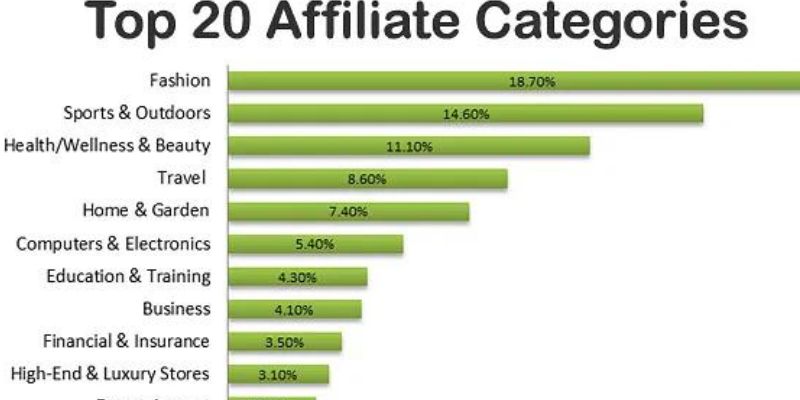
Affiliate marketing isn’t a quick path to rich; it demands time, dedication, and effort to thrive. When selecting a niche, consider your interests, expertise, and the competitive landscape.
Ensure your chosen niche is profitable and you can generate content without substantial initial investments. Ask yourself:
Am I curious to learn more about this niche?
If you are not interested in the niche, you cannot keep up with the latest trends and industry news. This will make it challenging to create engaging content and build trust with your audience.
Do I already have experience or training in this area?
You can start promoting products or services immediately if you know the niche. This will give you a head start over your competitors.
Can I create content without upfront investment?
Some niches, such as technology and travel, require a lot of upfront investment in equipment and content. If you do not have the budget for this, you should choose a different niche.
Is the niche profitable?
Ultimately, you want to make money from affiliate marketing. If the niche is too broad, you will face a lot of competition, and it will be challenging to make a profit. If the niche is too narrow, there will not be enough people interested in it.
Step 2. Create an affiliate website
Now, it’s time to create an affiliate marketing site. No need to stress about coding or taking web design courses. You can simplify things using a website builder or a WordPress theme to handle the technical work.
Your main tasks are the easier and more creative parts. We won’t cover the entire website-building process here due to space limitations, but we’ve already written a detailed guide.
Instead, let’s focus on your important decisions:
Choose A Blogging Platform
Selecting the right blogging platform is crucial. Many options are available, but the top choices include Blogger, Medium, or WordPress.org.
Blogger and Medium are free but offer limited customization and monetization. Alternatively, some platforms handle everything for you but can be pricey.
Our recommendation? WordPress.org.
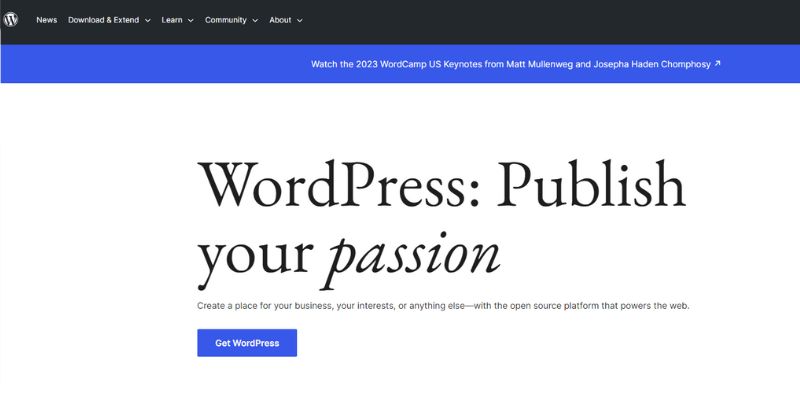
WordPress.org gives you the flexibility and tools to build a successful affiliate website without breaking the bank.
– It’s quick to start with.
– It’s cost-effective (you only pay for your domain and hosting).
– Get access to numerous free themes for a personalized look.
– WordPress plugins let you easily enhance and tailor your site.
– Have the freedom to pick your own domain name.
– Retain complete control over your content.
– Monetize through various means, including affiliate marketing, e-commerce, or advertising.
Decide a Domain Name
Choosing a name for your blog is a big deal. A wrong choice could turn people away before they even check out your site.
We can’t give you the perfect name since we don’t know your niche, but here are some general tips:
- Go for a “.com” domain, not something unusual like “.biz” or “.fm.” Studies show most people trust traditional domain endings.
- Keep it short, ideally one to three words. Short names are easier to remember.
- Make sure your name relates to your niche.
For example, a name like “UpPromote Blog” works well if you offer tips and tactics for any affiliate marketers or businesses that do affiliate marketing.
- Be flexible with synonyms. Synonyms can help you find a good alternative if your first choice is taken.
- Don’t narrow your focus too much on the name.
For example, if you name your site “Gourmet Vegan Desserts,” you might restrict your audience to only those interested in vegan desserts.
Do you require some assistance brainstorming names? Give the “Name Flix” tool a try. It can provide name suggestions tailored to your niche, just like this example:
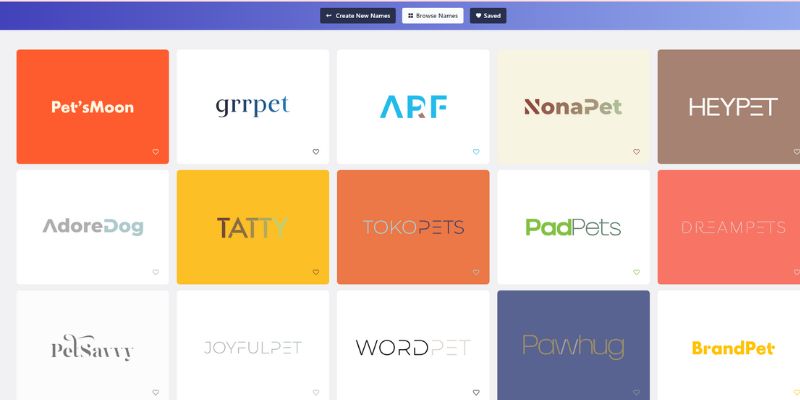
Choose A Hosting Provider
When picking a hosting provider, don’t just go for the cheapest. Quality matters; bad hosting leads to downtime, hurting your business.
There are many options in the market, such as Bluehost, SiteGround, and HostGator.
| Feature | Bluehost | SiteGround | HostGator |
| Price | Budget-friendly, starting at 2.95/mo | Competitive in value, from $19.99/mo to $54.99/mo. | Affordable plans, at 2.75$/mo |
| Ease of use | User-friendly interface | Intuitive and user-friendly | Easy control panel |
| Performance | Reliable with good uptime | Exceptional speed and uptime | Decent performance |
| Security | Basic security features | Advanced security features | Basic security with options |
| Customer Support | 24/7 support | Top-notch support | 24/7 customer support |
It’s essential to assess your individual needs and preferences when selecting a hosting provider for your affiliate marketing website.
Step 3. Choose the right affiliate program
After picking your niche and building a website, the next move is to select a referral program or products that match your niche.
This ensures your choices match with what you’re focusing on.
Kristin Ess has a large following on Instagram & Facebook and often uses her platform to promote hair care products. She has a blog where she shares hair care tips and tricks and a YouTube channel where she posts videos about hair care.
Kristin Ess’s affiliate marketing strategy is promoting products she uses and loves. She believes this is the best way to build trust with her audience and generate sales.

You can find suitable affiliate programs targeting Canadian audiences in two ways: directly or through marketplaces. If you already know of brands in your niche with affiliate programs, you can sign up directly, usually for free.
Alternatively, you can join an affiliate marketplace/ network or high-paying affiliate program to explore and sign up for thousands of programs in one place. These networks provide easy access to various reputable affiliate programs, making it simple for new marketers to get started.
Some favorite affiliate network available in Canada:
- ShareASale
- ClickBank
- Awin
- FlexOffers
- MaxBounty
- Amazon Associates
- CJ Affiliate (Commission Junction)
- Rakuten Advertising
When selecting an affiliate marketing program, don’t just focus on its reputation. Also, consider the commission, recurring commissions and earnings per click (EPC) rates. Even if a program has a low commission rate, a high EPC can make it worthwhile to join. So, weigh both factors when making your choice.
Step 4. Craft interesting content to promote affiliate offers
Now start thinking about your traffic source for affiliate marketing. You can use free platforms like Instagram, TikTok, YouTube, or blogging. No need for a dedicated website initially. Each has pros and cons.
Building a social media following is key; size matters less than reaching the right audience. For example, Papery Thoughts on YouTube succeeds with journaling affiliate marketing.

Whichever platform you choose, the key is creating trust-building content. In 2023, people spend 151 daily minutes online, mainly for great content. It’s the affiliate marketer’s winning strategy.
Creating a content library takes time, so it’s wise to plan ahead with a content calendar matched with your affiliate marketing goals. Your calendar should outline the types of content for specific days, like
- Tutorials: Teach your audience how to do something, such as how to use a digital product, physical product or service.
- Q&As: Answer questions your audience may have about a product or service.
- Product reviews: Give your audience an honest and unbiased product or service assessment.
- How to Guide: Show your audience how to do something, such as how to fix a problem or complete a task.
- Tips and tricks: Provide your audience with helpful advice or information.
When developing your content strategy, it is also important to consider a keyword strategy. This means choosing keywords that people are likely to search for when they are looking for information about your niche. You can use keyword research tools to help you find the right keywords.
For example, if you are an affiliate marketer for travel products, you might want to use keywords like “cheap flights,” “best hotels,” or “travel tips.”
We suggest seeking keywords that meet the following criteria:
- Low keyword difficulty scores (15 or lower).
- A respectable search volume (search volumes may differ by niche, but ideally, aim for terms with at least 100 monthly searches).
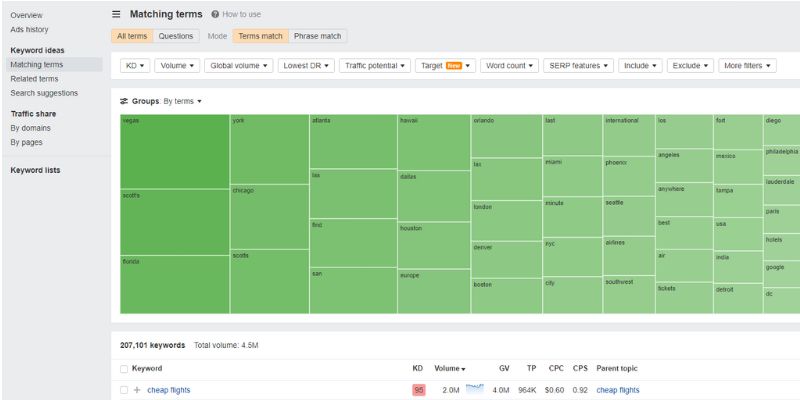
Another method entails entering a broad “seed” keyword into Google and searching for more precise, long-tail phrases within the Related searches section.
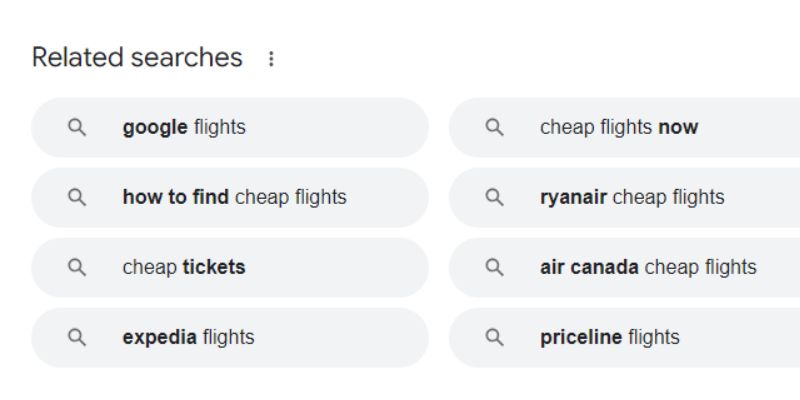
Once you have chosen your keywords, you can use them in your content titles, descriptions, and tags. This will help your content rank higher in search results, making it more visible to potential customers.
Or using Google Trends could also a great help to explore relevant keywords that on top trending.
When engaging in affiliate marketing, being transparent with your audience is important. This means clearly stating that you are an affiliate marketer and will earn a commission if someone clicks on your referral link and makes a purchase.
You can do this by adding a disclaimer to your content.
For example, you could say, “This post contains affiliate links, which means I may earn a commission if you click on them and make a purchase.”
Step 5. Boost your affiliate site’s traffic
If nobody sees what you’re sharing, you won’t make money as an affiliate marketer. We’ve talked about how important it is to leverage digital marketing by using specific keywords to get noticed on search engines, but this can take time. So, consider using other ways to get the word out, like
Guest Posting
Find authority websites or yours or have an audience interested in your offer. Ask if you can write a guest post for them, suggest a few topics, and if they say yes, write the post.
This helps you reach a new group of people, and sometimes, they might even link back to your site, which is great for getting noticed on search engines.
Let’s say you are an affiliate marketer for a travel company. You could guest post on a website that reviews hotels or provides travel tips. In your guest post, you could share your expertise on a particular destination or offer tips on saving money on travel.
You would also be sure to include a link to your website so readers can learn more about your affiliate program.
By guest posting on relevant websites or best affiliate marketing sites, you can reach a new audience of potential customers and generate traffic to your website. You can also improve your search engine optimization ranking like to build backlinks to your website.

Leverage Social Media
Social media can be a great way to promote your affiliate marketing website in Canada. However, it is important to remember that social media platform algorithms constantly change, so you must be prepared to adapt your strategy.
However, YouTube channels, Instagram profiles, and Facebook pages are excellent ways to attract more viewers to your content and drive traffic from search engines to affiliate partner content.
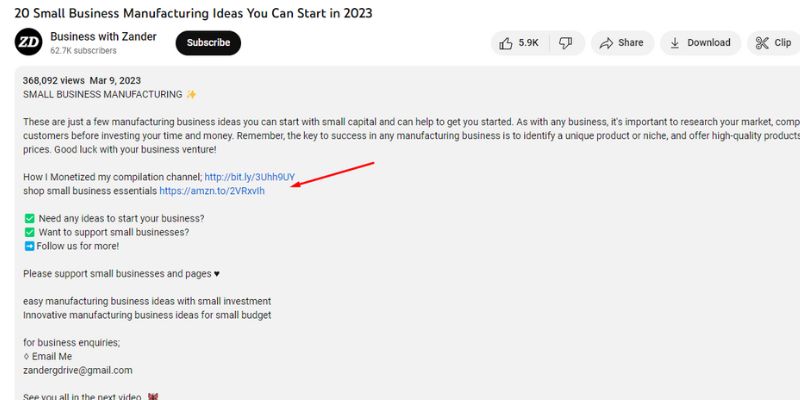
Share each article you create and consider posting them in relevant subreddits and Facebook Groups where your target audience is active.
Email Marketing
Email marketing is valuable, even though building an email list takes time. When you craft a new article, you can easily share it with your subscribers. The process is straightforward: Include a signup form in your blog posts and important landing pages.
If your readers have enjoyed your content, encourage them to subscribe to your newsletter.
However, always make it clear that they can unsubscribe whenever they wish. It’s important to respect their choices and avoid spamming.
Step 6. Track your performance
Tracking your affiliate marketing performance is essential to ensure that you are on the right track and making progress. It can also help you identify areas where you can improve your strategy.
There are several ways to track your affiliate marketing performance. You can use:
- Affiliate tracking software
- Google Analytics
- Manual tracking
Some metrics to track performance are:
- Clicks
- Conversions
- Earnings
Why Do Affiliate Marketing in Canada?
Affiliate marketing is a popular and growing industry in Canada, and there are several reasons why you might consider getting involved. Some benefits of affiliate marketing in Canada is
Passive income potential: Affiliate marketing can be a more passive way to earn income compared to other monetization methods. Once you create and optimize content, you can continue to earn commissions on sales generated from that content.
Low barrier to entry: Affiliate marketing is a low-cost business model in Canada, with startup costs often under $100. This makes it accessible to anyone with a computer and internet connection.
Potential for high income: While affiliate marketing income can vary widely, some affiliate marketers can earn significant money through affiliate marketing. The more traffic and sales you generate, the more you can earn.
Authenticity and trust: Involved affiliate marketing, where you only recommend products and services you have used and believe in, can build trust and authenticity with your audience. This can lead to more loyal followers and higher conversion rates.
Growing industry: Affiliate marketing spending is growing by over 10% yearly. This means there are more opportunities to find affiliate programs and partners to work with.
Flexibility: Affiliate marketing can be done anywhere with an internet connection, making it a flexible way to earn income.
That’s why affiliate marketing can be a great way to make money in Canada. With low startup costs and the potential for high income, it’s worth considering if you’re interested in earning money online.
FAQs
How much can affiliates earn in Canada?
Affiliate earnings in Canada vary widely and depend on factors like the niche, the affiliate program’s commission structure, and the effort put into marketing. Successful Canadian affiliates can earn anything from a few hundred to several thousand Canadian dollar per month or more.
Are there any legal issues with doing affiliate marketing in Canada?
Affiliate marketing in Canada is generally legal, but affiliates should be aware of advertising and consumer protection regulations. It’s important to disclose affiliate relationships transparently and comply with the Competition Act and the Canadian Anti-Spam Legislation (CASL).
Are Canadians eligible to join the Amazon affiliate program?
Yes, Canadians are eligible to join the Amazon’s affiliate program, known as Amazon Associates. They can promote Amazon products and earn commissions on sales generated through their affiliate links.
Do affiliates need to pay taxes in Canada?
Affiliates in Canada are required to pay taxes on their affiliate earnings. These earnings should be reported as income on their tax returns. It’s advisable to consult with a tax professional to ensure compliance with Canadian tax laws.
Is it legal for international students to do affiliate marketing in Canada?
International students in Canada can legally engage in affiliate marketing if they comply with Canadian laws and regulations. They should also be aware of any restrictions their study permits or visas impose.
How can one from India do affiliate marketing in Canada?
There are a few ways for someone from India to do affiliate marketing in Canada. One way is to create a website or blog that targets Canadian audiences. You can then promote affiliate products and services on your website or blog. Another way is to use social media to promote affiliate products and services. You can also join affiliate programs that allow you to promote products and services in Canada.
Conclusion
In Canada, affiliate marketing is a cost-effective way to earn money. Choose a niche, pick affiliate programs, create a website or social media presence, and make quality content.
Optimize for search engines and track your progress. Avoid mistakes like not knowing your products or making bad content.
Affiliate marketing offers flexibility and can be profitable, but it needs dedication and hard work. It’s a great way to make money online in Canada while staying authentic with your audience.







